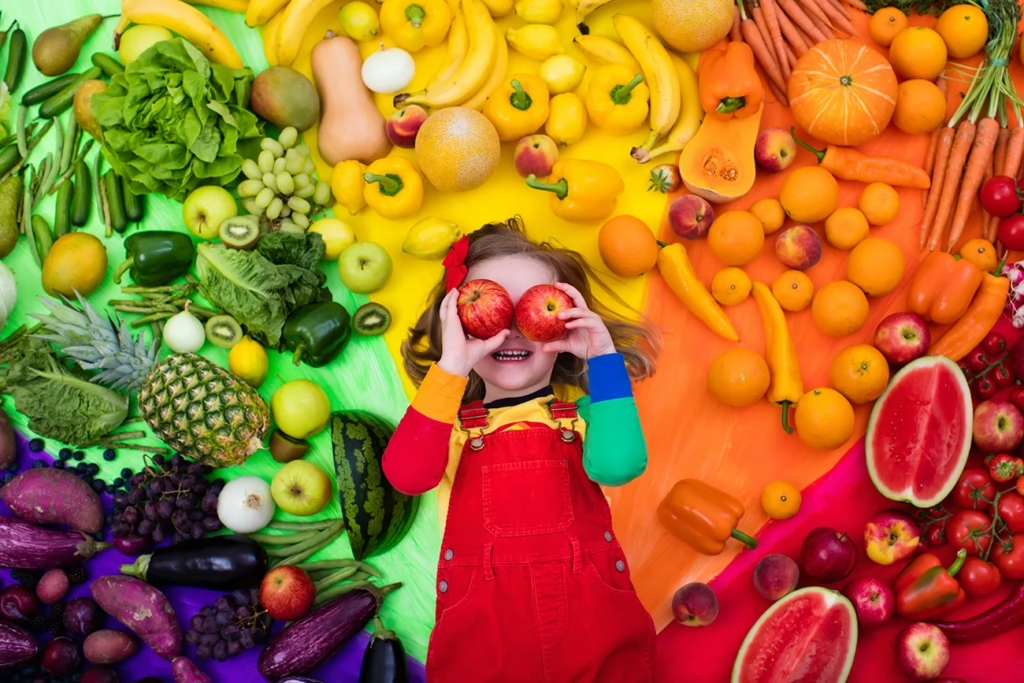
From breakfast to dinner, and all the (seemingly endless) snacks in between, food fuels our kiddo’s growing brains and bodies! But for many kids, food simply appears on their plate without much thought about how it got there. Teaching children about where food comes from is a great way to spark curiosity, encourage healthy eating habits, and foster a deeper appreciation for the environment.
In this post, we share fun and engaging activities that make learning about where food comes from an exciting adventure for kids of all ages. Let’s dig in!
Jump ahead:
Starting a Garden at Home
Starting a garden at home doesn’t require a lot of space or even extensive knowledge. Many fruits, veggies, and herbs are relatively easy to grow in pots in your backyard, patio, balcony, or even on a windowsill.
Some plants that are fast-growing and easier to care for include:
Choosing fast-growing plants can help keep kids interested and excited about their gardening project. Letting them help with planting, watering, and harvesting provides a hands-on way for children to learn about the lifecycles of fruits, veggies, and other foods we eat every day!
Sprouting Seeds in a Jar Experiment
Want to witness the magic of plant germination up close? Sprouting seeds in a jar is an easy experiment that demonstrates exactly how fruits, veggies, and other foods grow!
What You’ll Need:
Directions:
This fun science experiment allows little learners to observe the germination process in real-time, and up close! They’ll be amazed to see the tiny roots, stems, and leaves grow over time.
Cooking Activities for Kids
There’s no better way to teach children about food origins than by cooking together! Using fresh ingredients, you can transform mealtime into a hands-on learning adventure.
Remember, every child is unique, so focus on cooking activities that they can do safely and provide guidance when needed. Also, never leave a child unattended while cooking, and always supervise them around sharp tools and hot appliances.
Below are some age-appropriate cooking ideas you can do at home:
Toddlers (3 years old and under):
Preschoolers (Ages 4-5):
Early Elementary (Ages: 6-8):
Older Elementary (Ages 9-10+):
Cooking together not only helps children learn about where their food comes from but also builds essential life skills and creates lasting memories.
Fun Food Facts for Kids
In addition to activities, sharing fun food facts with kids is a great way to introduce little learners to farm-to-table concepts. It can spark their curiosity, encourage them to ask questions and get them excited to learn more.
Here are some interesting and kid-friendly food facts that are sure to capture their attention and get them thinking:
Meet Local Farmers and Food Producers
Visiting Sonoma County farms, gardens, and other food producers offers an incredible opportunity for children to experience firsthand where food comes from. Plus, it’s a fun and engaging way to spend a day!
Many farms in our area offer guided tours, providing a firsthand look at how our food is grown and raised. This immersive experience allows kids to develop a deeper understanding of the work and dedication that goes into growing and producing our food.
Sonoma County Farm Trails is a great organization and resource for finding local, kid-friendly farm tours. Check their website for the most up-to-date tour schedules and availability!
Shop at Farmer’s Markets
A visit to the farmers market is another fun and exciting way for children to learn where food comes from, and it is also a great sensory learning opportunity. Walking through the market gives kids the chance to see, touch, and smell fresh produce and even taste new foods. Meeting local farmers, ranchers, and agricultural workers can also help bridge the gap between the food we eat and the people who produce it.
The Santa Rosa Original Certified Farmers Market is the largest farmers market in Sonoma County. They host markets throughout the year in Santa Rosa, Guerneville, and Cloverdale, featuring a wide selection of local vendors and goods. Check their calendar to find upcoming Farmer’s Markets near you!
Explore the Edible Garden at the Children’s Museum
Another great way to introduce kids to the magic of where food comes from is in the Edible Garden at the Children’s Museum of Sonoma County! Our garden is a place where children of all ages can learn about the full lifecycle of fruits, veggies, and other plants in a fun and interactive way.
Through our guided educational programs like Garden Party with Farmer Emily, children can learn first-hand how plants grow and how to care for them from seed to harvest. Whether helping with watering, weeding, planting, or harvesting, our Edible Garden offers fun farm-to-table learning opportunities for the whole family.
Plan your next visit to the Children’s Museum of Sonoma County today!